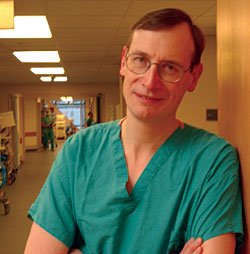Dartmouth alumnus scores neurosurgical success at DHMC
It's a cold evening in December, and Boston's Handel & Haydn Society (known as H&H) is rehearsing The Messiah. Among the basses, the third man from the right pulls a pencil from behind his ear, marks his score, and opens his mouth to sing. None of this seems remarkable until you consider that, less than five months before, this man was lying motionless in a hospital bed, learning how to breathe.
The third man from the right used to know how to breathe, of course. He used to know how to sing, too—he was a member of two choral groups as an undergraduate at Dartmouth and he has sung with H&H since 1994. But on July 6, 2002, Clifford Rust, a 1986 graduate of Dartmouth College, tumbled headfirst off his mountain bike in a New Hampshire ravine. Suddenly singing and breathing— not to mention talking, walking, and even being alive— were things that he could no longer take for granted.

|
|
Neurosurgeon Perry Ball, pictured at DHMC, operated last
July on Clifford Rust after he broke his neck in a bike accident.
Five months later, Rust was again singing Handel oratorios. |
"I landed on my head," recalls Rust. "You hear that awful crunching, and . . . you know." Rust lay motionless while friends got help. Mosquitoes were swarming, but he could feel them only on his face. "I tried not to think too much," he says.
The local hospital quickly sent Rust to DHMC. Meanwhile, a friend phoned his wife. "They might want to keep him overnight," Judith Rust recalls hearing. In fact, Clifford Rust stayed at DHMC until July 17. He observes dryly that his injury, between the sixth and seventh vertebrae, is "very popular for sports injuries." It leaves people quadriplegic most of the time, Judith Rust adds, though fortunately they didn't find that out right away.
Hope: Fortunately, too, Rust's spinal cord wasn't severed. Dartmouth neurosurgeon Perry Ball cut through the front of his neck and put a plate in his spine, near the injury. There was hope of some recovery. But no one could say how much. "The initial prognosis was that he'd be in a wheelchair for eight months to a year," Judith Rust says. His mobility, strength, and flexibility all were question marks. The only thing certain was that a long recovery lay ahead.
Once he was stable, Rust was transferred to Spaulding Rehabilitation Hospital. He spent three and a half months there, relearning everything. At first, he focused on small goals, like putting on his socks. Gradually he made progress. He sat unsupported, he stood, he walked.
And he began to think of singing again. "Speaking was tough at first, much less thinking of singing," Rust says. But he worked hard and soon set a more ambitious goal: to sing with H&H in their first performance of the season. "Having that goal to work toward really made a difference," he says. "It was just incredible therapy on every level, physical and mental," he says. "It felt great."
Voice: It helped, Rust says, that "at least the singing voice felt the same." For everything else, he has had to retrain his muscles, working consciously to do what was once automatic. But singing is still singing. "Because of that familiarity, being able to do it . . . it just has a very, very deep significance," Rust says. "I've always loved music, but it was just one of the thousand things I took for granted." He pauses, then smiles. "I'm not doing that with anything these days."
Louise Kennedy
If you would like to offer any feedback about this article, we would welcome getting your comments at DartMed@Dartmouth.edu.
